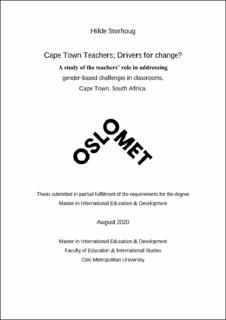| dc.description.abstract | Despite attempts by the government, non-governmental organizations and various institutions to achieve gender equality in South Africa, major challenges remain. Femicide, rape, abuse, gender-based violence and discrimination towards females are all symptoms of a gender unequal society, but is not a comprehensive list of the reality of gender inequality. Education institutions, with teachers in the front lines, play a crucial role in transforming the attitudes, perceptions and practice of gender, which leads to many of the gender-based challenges. With a theoretical and conceptual framework of gender as a social construction, socialization and critical pedagogy, this qualitative case study research explores the teachers’ role in addressing gender-based challenges, in four primary schools in Cape Town. The teachers’ experiences of addressing gender-based challenges in school, as well as the practical and pedagogical obstacles and challenges they face in doing so, lay the foundation for exploring to what extent teachers have capacity and competence to be drivers for change towards gender equality. The findings illustrate that the gender-based challenges in the classrooms are closely linked to the patterns of different social expectations towards girls and boys. Particularly, the expectations towards boys as fulfilling the “masculine” role has been viewed as an obstacle related to gender-based violence, bullying towards boy learners who do not conform to the stereotypical masculine role, and disrespectful attitudes towards female teachers. Through dialogue and practical lessons, some teachers engage learners in critical discussions, questioning the stereotypes and expectations towards gender roles. The findings indicate that female teachers to a greater extent address the gender-based challenges than male teachers, and seem to be more dedicated in doing so. By examining the pedagogical approaches applied by some of the teachers, this study argues that classrooms are a location of possibility to challenge and transform the attitudes, perceptions and practice of gender roles which often lead to gender-based challenges. | en_US |
